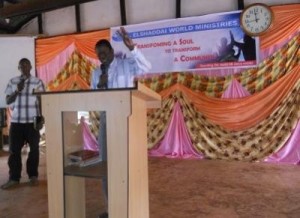Text: James 1:2-4, Consider it all joy , my brethren , when you encounter various trials
Theme: Trials
Introduction: A book of James was written by James, the oldest half brother of our Lord Jesus Christ (Mark 6:3). He was one of the leaders (pastor) of Jerusalem church (Acts 12:17; 15:13,21:18 and Galatians 2:12 and He was considered as one of the “pillars” of the church along with Peter and John (Galatians 2:9).
The Book was written to Jewish believers with authority of a person who had seen the Lord personally (1Corinth. 15:7). The recipients of this letter were undergoing tough times due to persecution which broke out on the day Stephen was martyred, and persecution under King Herod Agrippa 1 from AD 44 (Acts 12).
Trial is defined as a test of a person’s endurance and patience. The Greek word used in this text for “trial” denotes an assessment of performance, quality and sustainability of a material. Outwardly trials are the occurrences that break the pattern of peace, comfort, joy and happiness in some ones life.
Trials are quite significant throughout the Bible, and therefore, it is very important to dig a little deeper into trials and their possible benefits.
Question: What purpose do trials serve in a life of a person chosen by God?
While I was a student in a discipleship school, an old and very experienced teacher asked a question, “how can you tell that God has called you to ministry?”. We gave all sorts of answers but were all wrong. The correct answer was, “you go through trials!” It was amazing and scary revelation, but absolutely true: I have not yet seen a man or women used to serve divine purpose in the Bible and contemporary times who had not been subjected to severe trials. In my own conclusion, trials serve to fulfill three main purposes in the life of a person chosen by God.
Purpose One: PRUNING (John 15:2)
The word, “prune” is an agricultural term meaning removal of unnecessary leaves and branches from a plant with the intention of obtaining maximum fruits. A lot of plant sap can be wasted on branches and leaves that could have been converted to more and better fruits. In the similar way, a Christian’s vital life could be used on less profitable ways if some things are not cut off. God removes outgrowth in a person’s life in order to make them more suitable and available for his service. This process is likely to be hurtful and detestable, but finally beneficial.
Moses was brought up in Egyptian culture, values, mindset, education etc. He had a special calling from God which compelled him to undermine his opportunities and comfort in Pharaoh’s household in order to associate with highly despised Hebrews. It was a choice in the right direction (Hebrew 11: 24-25). However, God had to subject him first to a form of trimming for 40 years to remove all unwanted additional Egyptian values. For a prince to stay out doors, in cold and frost attending to some else’s sheep for 40 years was not a pleasant experience. I am sure it was not Moses’ choice but a survival technique. He emerged a perfect tool in the hands of God. God confessed that Moses was more special than every one else whom he talked with indirectly through dreams, but not Moses, with whom He dialogued face to face (Numbers 12:6-8). He was also described as the meekest of all mankind (Numbers 12:3)
Another example of a man thoroughly pruned was Joseph. He was a young man full of the fear of the Lord and pride against his brothers. God had a purpose for Joseph. He had to go through 13 years of pruning in order to fit it the mission of saving the entire world from termination due to famine. At the end of the divine course, he was able to understand that it was the plan of God, and not his brothers (Genesis 45:8-9).
Purpose Two: TRAINING
Training is God’s responsibility to ensure that His children and servants understand and know Him. Knowing and understanding God is more important than the service rendered unto Him (Jeremiah 9: 23-24). It is important to study the Bible and acquire knowledge of the Bible, Leadership and Theology from seminaries, but that does not guarantee the quality that God desires to achieve in the life of a person He intends to make use of. Real divine training is in the furnace of affliction as prophet Isaiah puts it (Isaiah 48:10). We learn practical lessons of love, endurance, forgiveness, trust etc., through hard and painful times. A miracle would not be valid unless God has brought one to the end of himself (the wits end). King David seems to imply the same scenario of intense challenges as a means of understanding God’s statutes (Psalms 119: 71).
The story of God’s training is compared in the Bible with the way an eagle trains the eglets how to fly. An eagle is a powerful bird of prey, which the Bible has used a lot to illustrate truth about God’s dealings with His children. An eagle builds up her nest on a high tree of a cliff far above the ground, many times over looking a water body (Jeremiah 49:16). This ensures safety for the eggs, then the tender eaglets. The nest is made of a structure from interlocked thorns and briars. The nest finishing is made of linings with soft materials such as feathers, soft grass and leaves, and any other material that makes the finishing comfortable.
Two eggs are most often laid, and hatched to eaglets. Both parents provide for the eaglets. This comfort is only for a time, till the eaglets are ready for flying lessons. Without warning the mother eagle, blows off all the soft lining in the nest exposing the eaglets to discomfort of thorns (Deuteronomy 32:11). At this point, the eaglets are ready for relocation.
The mother eagle then positions herself in such a way that the eaglet dives on to her back ready for relocation. With the Eaglet on her back, she flies much higher. Without warning she makes a sudden tilt releasing the eaglet to the mercy of gravity. The eaglet struggles to sustain the flight on its own as the mother carefully follows. When the eglet is just about to crash-land the mother is just in position for the eaglet to land on her back. The lesson is repeated several times till the eaglet can sustain a flight on its own.
In a similar way, God ensures that we learn the intended lesson first. It does not matter how long it will take. We may have to go though a couple of laps till we get it right. People who have been to university understand what is meant by having “ a retake” or “a remedial.”
Purpose Three: DISCIPLINE (Hebrews 12: 3-11)
In God’s kingdom, there is order, purity and spotlessness. As we strive to walk with God, human nature is constantly in opposition and occasionally infiltrates making us susceptible to error. We grow progressively into Christ likeness, and a long the way both accidental and deliberate errors are made.
Obviously as any loving father does, He makes a correction. In human terms spanking a child in a mistake becomes inevitable. A firm hand of discipline is a parental responsibility, which a wise child would appreciate.
There are many cases of people in the Bible whom God chastised for carelessness, negligence and blatant rebellion. A good example was King Jehoshaphat who was an excellent King, but made mistakes to align with the wicked king Ahab, the husband to the notorious queen Jezebel. He nearly lost his life in the battle field. He also forgot that, and went into business venture with another wicked king of Israel prompting the Lord’s intervention by destroying the ship and permanently terminated the investment.
Conclusion: It is a common tendency for Christians, more especially the Pentecostals to see demons in everything. Yes, certainly, Satan is an adversary of Mankind and God, but he is limited. Satan cannot do any thing to a true child of God without God’s permission from God.
Today, the devil enjoys unnecessary publicity because of our ignorance of Scripture. Trials are good because they have a divine objective.
If it is pruning, let God remove the entire unnecessary luggage so that we bear more fruit.
If it is teaching, yes, let us be diligent to learn the lesson quickly and progress to another level of growth and service.
And if it is, discipline, let us repent and change. All in all, LET GOD HAVE HIS WAY IN ANY TRIAL , AMEN!


